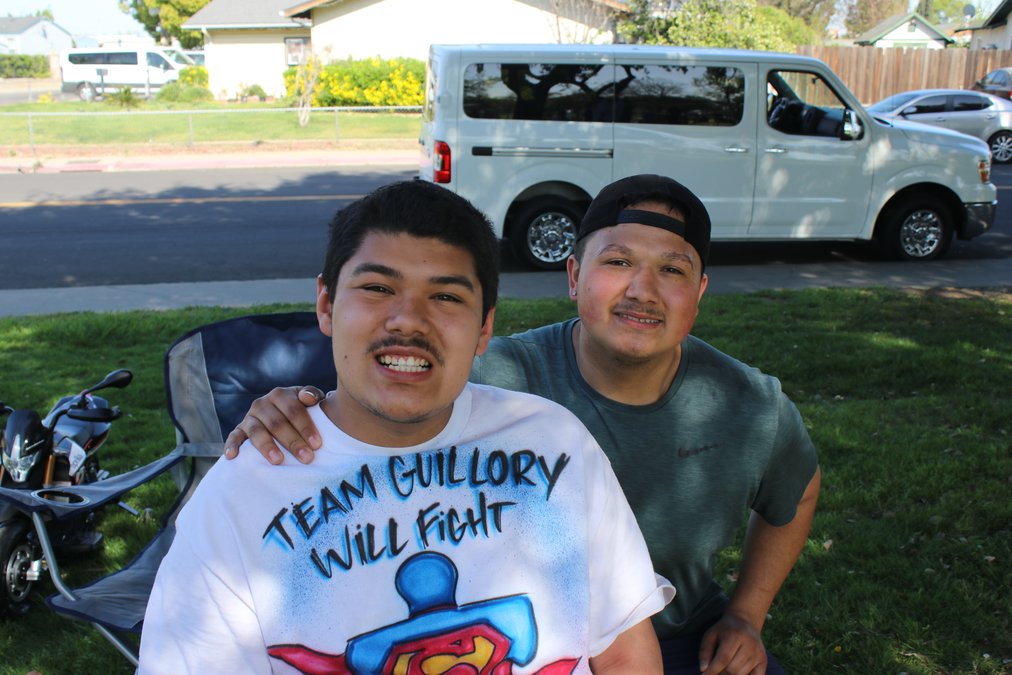Cristian Palafox was drenched in sweat when he completed his mile-run around the city block surrounding Smyrna Park and Carroll Fowler Elementary School last Wednesday afternoon.
Every hour on the hour during from 7 a.m. on March 31 to midnight, the 20-year-old Ceres man ran around the park to help promote public awareness of autism – a condition that his family knows all too well with his cousin Lucas Guillory, 18, of Ceres.
Lucas was diagnosed with autism and among the family members who supported Cristian’s effort by keeping him company and displaying signs on their cars, was Jesse Guillory, who is Lucas’ father.
“We started noticing problems at age two,” said Jesse. “We’d try to touch him and he’d bang his head on the ground. No eye contact. Stuff like that. Then at three UC Davis (Medical Center) diagnosed him. He was severe. He’s 18 but he has the mindset of a seven-year-old. We just live with it. Everybody got used to it.”
Lucas’ parents will be in court next month to take legal guardianship of their disabled son since he is legally an adult.
Despite the severity of autism, Jesse said his son can watch a movie one time and memorize it.
Palafox, a 2018 graduate of Ceres High School who is now attending San Jose State University to become a physical therapist, used to participate in the Autism Walk with about 50 family members.
“This year I wanted to do something myself,” said Palafox.
Autism is a developmental disorder characterized by difficulties with social interaction and communication, and by restricted and repetitive behavior. There’s no single cause for it, and symptoms can be very mild or very severe. Cristian said that his cousin has little desire for socialization.
“He has like a 3.5 (grade point average) and above so in school work he knows what to do but socially he is not much of a person,” said Cristian of Lucas.
The family stayed at the park until 9 p.m. Cristian went home and returned for his run at 10 p.m., 11 p.m. and midnight. He intended to run seven more times until 7 a.m. Thursday but his legs began cramping up badly.
During the run there were honks of support. Several parents with autistic children stopped by to thank him for drawing awareness to the issue.
Typically a child with Autism spectrum disorder (ASD) has a hard time interacting with others. Problems with social skills are some of the most common signs. They might want to have close relationships but not know how.
If a child is on the spectrum, they might show social symptoms by the time they reach eight to 10 months old. These may include any of the following:
• They don’t respond to their name by their first birthday.
• Playing, sharing, or talking with other people don’t interest them.
• They prefer to be alone.
• They avoid or reject physical contact.
• They avoid eye contact.
• When they’re upset, they don’t like to be comforted.
• They don’t understand emotions -- their own or others’.
• They may not stretch out their arms to be picked up or guided with walking.
About 40 percent of kids with autism spectrum disorders don’t talk at all, and between 25 and 30 percent develop some language skills during infancy but then lose them later. Some children with ASD start talking later in life.
Most have some problems with communication, including:
• Delayed speech and language skills;
• Flat, robotic speaking voice, or singsong voice;
• Echolalia (repeating the same phrase over and over);
• Problems with pronouns (saying “you” instead of “I,” for example);
• Not using or rarely using common gestures (pointing or waving), and not responding to them;
• Inability to stay on topic when talking or answering questions;
• Not recognizing sarcasm or joking.
Palafox also appealed for public donations through social media to benefit Autism Speaks Inc., the largest autism advocacy organization in the United States. It sponsors autism research and conducts awareness and outreach activities aimed at families, governments, and the public. The public can still contribute by visiting autismspeaks.org







